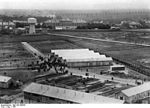Pithiviers internment camp was a concentration camp in Vichy France, located 37 kilometres northeast of Orléans, closely associated with Beaune-la-Rolande internment camp in deporting foreign-born and some French-born Jews between 1941 and 1943 during WWII.
Originally intended for German POWs, Pithiviers initially housed refugees and later French POWs. In 14 May 1941, foreign-born Jews (mostly Polish expatriates living in the Paris Prefecture) were arrested and interned there during the Green Ticket round-up and in July 1942 during the Vélodrome d’Hiver round-up. Most of the inmates were sent to Auschwitz concentration camp where they were murdered.
Prisoners engaged in forced labor inside and outside the camp, with some paid. The camp had an infirmary staffed by Jewish inmates, maintaining basic healthcare. Despite harsh conditions, prisoners maintained aspects of Jewish life, holding services, celebrating holidays, and supporting cultural activities. Resistance took various forms: leaders advocated for better conditions while some collaborated secretly with the Union des Juifs pour la Résistance et l’Entr’aide, a secret resistance organisation, formed by Jewish Communists in Paris. The camp, with 19 barracks, workshops, a canteen, and an infirmary, was fenced, close to town, and supervised by French gendarmes during its first year of operation.
In May 1942 German authorities under SS Officer Theodor Dannecker, took over operations with the first transport to Auschwitz leaving on 25 June 1942. By September of that year at least 6,080 inmates had been deported. The camp then reverted to French control holding primarily non-Jewish communist prisoners. In March 1944 some inmates successfully dug a tunnel under the infirmary and managed to escape. The camp was liberated on 9 August 1944 after coming under Allied bombardments.







